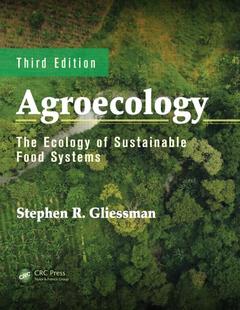Agroecology (3rd Ed.) The Ecology of Sustainable Food Systems, Third Edition Advances in Agroecology Series
Auteur : Gliessman Stephen R.

Key features:
Agroecology is a science, a productive practice, and part of a social movement that is at the forefront of transforming food systems to sustainability. Building upon the ecological foundation of the agroecosystem, Agroecology: The Ecology of Sustainable Food Systems, Third Edition provides the essential foundation for understanding sustainability in all of its components: agricultural, ecological, economic, social, cultural, and even political. It presents a case for food system change and why the current industrial model of food production and distribution is not sustainable.
See What?s New in the Third Edition:
- Chapters on animal production and social change in food systems
- Updated case studies, references, websites, and new research
- Emphasis on how climate change impacts agriculture
- Greater focus on health issues related to food
The book begins with a focus on the key ecological factors and resources that impact agricultural plants and animals as individual organisms. It then examines all of the components of agroecosystem complexity, from genetics to landscapes and explores the transition process for achieving sustainability and indicators of progress. The book then delves into power and control of food systems by agribusiness, and the need to develop a new paradigm that moves beyond production and explores issues of food justice, equity, food security and sovereignty. The book concludes with a call to action so that research and education can link together for transformative change in our food systems.
Groundbreaking in its first edition, respected in its second edition, this third edition of this standard textbook has evolved along with the field. Written by an expert with more than 40 years of experience, the third edition begins with a strong ecological foundation for farming practices and ends with all of us thinking about the critical importance of transitioning to a new paradigm for food and agriculture, and what this means for our future.
Introduction to Agroecology
Case for Fundamental Change in Agriculture
Agroecology and the Agroecosystem Concept
Plants and Abiotic Factors of the Environment
The Plant
Light
Temperature
Humidity and Rainfall
Wind
Soil
Water in the Soil
Fire
A More Complete Autecological Perspective
Biotic Factors
The Environmental Complex
Heterotrophic Organisms
System-Level Interactions
Population Ecology of Agroecosystems
Genetic Resources in Agroecosystems
Species Interactions in Crop Communities
Agroecosystem Diversity
Disturbance, Succession, and Agroecosystem Management
Animals in Agroecosystems
Energetics of Agroecosystems
Landscape Diversity
The Transition to Sustainability
Converting to Ecologically Based Management
Indicators of Sustainability
Bringing about a Sustainable World Food System
Agriculture, Society, and Agroecology
Community and Culture in the Remaking of the Food System
From Sustainable Agroecosystems to a Sustainable Food System
Glossary
References
Index
Date de parution : 12-2014
21x28 cm
Disponible chez l'éditeur (délai d'approvisionnement : 15 jours).
Prix indicatif 80,97 €
Ajouter au panierThèmes d’Agroecology :
Mots-clés :
Codling Moth; Moisture Content; C3 Plant; Sustainable Food System; Soil Fertility; Case Study; Vice Versa; Food System; Total LER; Energy Source; C4 Plant; Organic Strawberries; Removal Interferences; Benecial Insects; AFNs; Industrial Food System; Benecial Organism; Sustainable Agroecosystems; Soil Prole; GE Crop; C3 Photosynthesis; Solar Energy; Can; Soil Management; GE Organism



